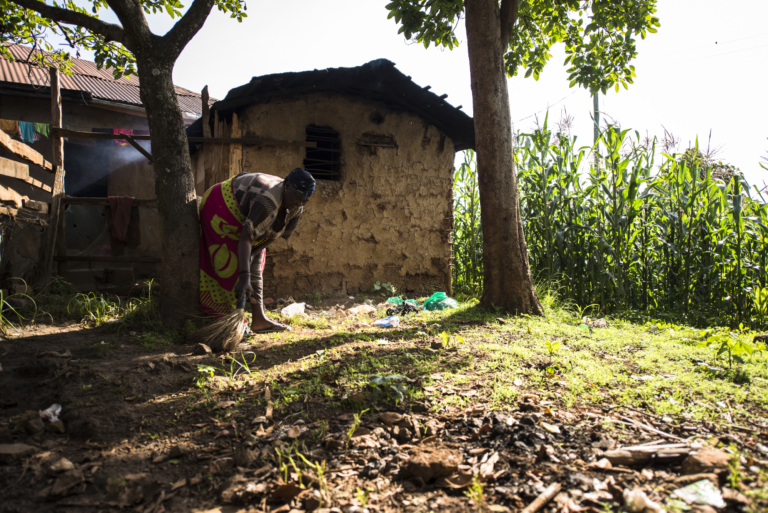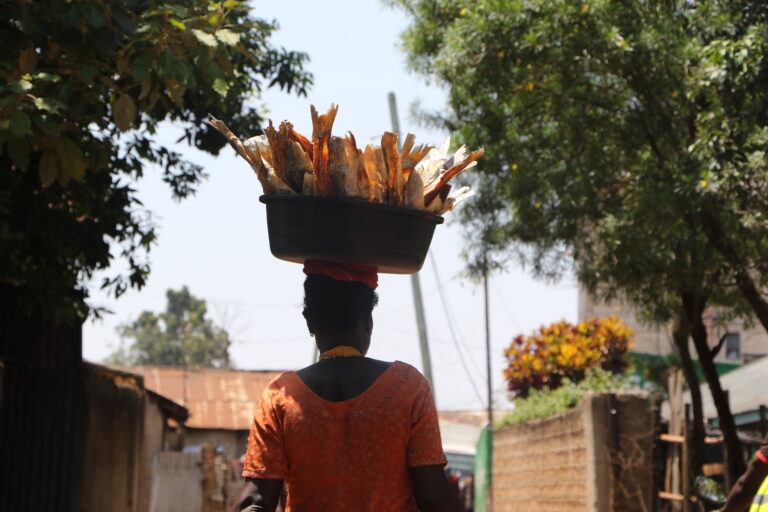This is the third blog post of the AI Research and COVID: Journeys to Gender Equality and Inclusion series. This blog series emerged from the “writeshop” organized by Gender at Work as part of the Data Science and Artificial Intelligence Research Program to Combat COVID-19, also known as AI4COVID, financed by the International Development Research Centre (IDRC) and Swedish International Development Agency (SIDA). The initiative was part of the final Gender Action Learning workshop held in Nairobi, Kenya in February 2023.
In this blog post, Michelle Mbuthia discusses her personal experience of gender inequality and unfair distribution of domestic labor during the Christmas season in Kenya, and the need for candid discussions and collective efforts to challenge and change traditional gender norms and create a more equal society.
Taking a stand
I am on strike.
I have been on strike since last Christmas and will continue to be so until things change. Whenever that will be.
For many people in Kenya, Christmas is a time when we often leave the city for our ancestral homes in the countryside to celebrate the festive season. With urbanization and the general fast pace of life these days, the festive season offers a once-in-a-year opportunity to touch base, catch up and reconnect with one’s roots. It is a time to enjoy traditional delicacies, music and all round indulgence. Endless pots of pilau and chicken stew, stacks of soft, layered chapati and all-you-can-eat nyama choma on the grill. If you are fortunate to still have your grandma around, you may enjoy the occasional pot of kimanga. In Kenya we say: “The year has been rough so it’s time to ‘apologize’ to the body.”
As we pack our bags, ready to leave for the village, a cousin sends out a text to the cousins’ WhatsApp group: “Girls, I hope everyone has gotten rid of their Nairobi nails. Get ready to get down and dirty!”
A few days later, as everyone else is busy enjoying nyama choma, cracking jokes with that long-lost cousin and having a sip of traditional liquor, one group is usually missing out on all the fun. Not for want of a sense of fun but because someone has to do the work that leads up to the enjoyment.
As a child, I was oblivious to the work that goes into ensuring the chapati are layered just so, the chicken stews are rich and saucy, and each grain of rice in the pilau is equally coated in the masala and does not stick to the next. The same person must make sure that the house is clean (and decorated, if necessary), and the kids are always bathed, fed on time and in bed before it is too late. They also need to clean all the dishes, including pots and servingware. In some homes, cooking for large groups of people can only be done over a wood fire, meaning that pots are always covered in soot, and eyes and noses are always streaming from blowing on kindling and firewood.
Now that I am a grown woman, I am expected to join the ranks of sisters, mothers, aunties and cousins who bear the task of ensuring that the family has a merry Christmas.
The ‘sisterhood’ is caught up in a continuous week-long cycle of cooking, cleaning and planning for the next meal. Cook, clean, plan. Cook, clean, plan. Cook, clean, plan. You dish up only after everyone else has some food on their plate; you bathe after your chores are done; and because of the long cooking times, you are always thinking about the next meal and what needs to be prepared while eating the current meal.
The men, on the other hand, get together for the one-day group assignment of slaughtering the Christmas goat.
It is a lot of work but someone needs to do it. There are two sets of able-bodied adults in the homestead— overworked females and chipper males. So why is the burden of work only on one group?

The Dispute: Gender imbalances behind the scenes
For centuries, my culture has dictated that women take charge of kitchen and home affairs, while men’s domain resides outside of the home, tending to fields, livestock and/or fish. However, times have changed and in many families men and women have different forms of employment outside of the home. Yet cultural ‘policy’ still dictates that only one group of people is responsible for the domestic care work. These perspectives pervade other spheres of life, such as finances and land ownership. While significant strides have been made, land ownership for women is still a challenge and inequalities in incomes are still pervasive between men and women.
I’m not surprised to see this imbalance play out in the health system. From the distribution of leadership roles to policymaking, gender inequality is pervasive at all levels of society and has even led to the development and implementation of gender-blind policies. Gender blindness here refers to the lack of consideration as to how a given policy may affect women and men differently. For example, men and women access healthcare in different ways. This means that governments would need to tailor health promotion messaging in different ways.
In 2021, I participated in a review of 450 COVID-19 health policies from 76 countries across the world. The analysis, a component of the which was a collaborative effort by University College London (UCL), African Population and Health Research Center (APHRC) and International Center for Research on Women (ICRW) in India, sought to examine if governments had incorporated a gender lens in their development and execution of COVID-19 response measures. Of those assessed, 91 percent were termed gender-blind, as they did not consider the policies as having a significant impact on people’s health outcomes, specifically from a gender standpoint.
Socially constructed gender norms can mean that women’s access to COVID-19 prevention ―including vaccination, testing and treatment ― is hindered. This could be due to unaffordable fees or the inability to travel to services. The United Nations’ Gender Development Index confirms that countries with a high level of gender equality have higher immunization coverage. Meaning that in countries where gender disparities are rife, women and children are more at risk of preventable diseases.
So this then begs the question: Does how we are raised, and the values and norms we pass on from one generation to the next, mean that we are doomed to have health policies that perpetuate these norms? And what does this mean when the gender norms being perpetuated have a negative effect on women’s and girls’ health, and become a matter of life and death? What will it take to disrupt existing gender-related norms and values to create new norms, where women and men take equal responsibility for reproductive health? Or where the work of cooking, cleaning and caring is shared equally, leaving women with more time to relax and even participate in family bonding activities?

The Conciliation
Maybe it is time for us as a society — men, women, the non-binary, everyone — to have more candid discussions at the fireside, the wash area, in the living room, and at the dinner table, about what gender and gender inequality looks like at individual and family levels, so that we can fix the associated problems at community and national levels. Perhaps if we unpack and unlearn, we can reconfigure how we see each other and how we think, and ultimately develop and implement laws and policies that are inclusive and gender responsive.
After I went ‘on strike’ my female cousins were supportive — they said they ’want in.’ (We’ll see if any of them join me during Christmas 2023.) The older women are indifferent, resigned to the way things have always been. Perhaps it is time I end the strike, but not before a serious family meeting that ends with the men and boys assigned a few more tasks, such as cooking some meals, cleaning the house and doing the dishes. A dream maybe, but not impossible.
This blog post was written by Michelle Mbuthia, Communications Officer at African Population and Health Research Center and afrofeminist, and is licensed under a CC BY 4.0 license. © 2023 Michelle Mbuthia. You can find Michelle on LinkedIn and Twitter.
Curious to read more reflections that explore individual level experiences of gender and inclusion from childhood to the professional life and society at large? Read the other blog posts from this series here: Amelia Taylor’s Can AI have its cake and eat it too? & Meghan Malaatjie‘s Are women programmed to think less and do more?.



